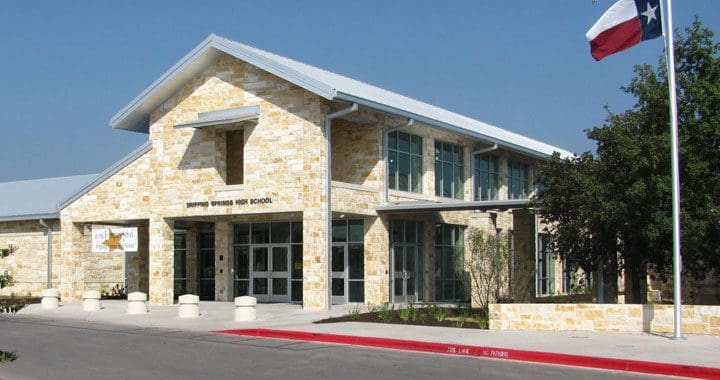Citizens in Dripping Springs are organizing against a half-billion-dollar school bond package on the November ballot they say includes “irresponsible” spending and will result in “crushing” tax hikes and debt for local residents.
“Whether or not bonds pass or fail in a community is directly dependent upon voter education and outreach,” says Ashley Whittenberger, who is helping inform her neighbors about aspects of the proposed spending plans that are glossed over or ignored by the school district and other bond boosters.
Dripping Springs Independent School District, just west of Austin, is asking voters to approve three ballot propositions totaling $481 million in bond debt—all of which must be repaid, with interest, by local property taxpayers:
Proposition A: $199 million for “growth and lifecycle” ($387 million with interest)
Proposition B: $275 million for “high school #2” ($553 million with interest)
Proposition C: $6.5 million for “technology lifecycle replacements” ($7.7 million with interest)
With interest, the proposed bonds’ total cost to taxpayers is $948 million. DSISD taxpayers are currently on the hook for $399 million in outstanding bond debt principal plus interest.
As in other school districts across the state, Dripping Springs ISD officials tout that the tax rate will (likely) remain the same. Yet they acknowledge skyrocketing property values will allow the district to collect and spend more tax money at that rate—meaning homeowners’ tax bills will go up.
“It is absolutely a tax increase,” Whittenberger said.
“DSISD’s 2022 bond propositions will increase bond debt taxes for an average residence by over 60 percent in just five years, with even further tax increases planned for the following years,” she said. “This is after a 42 percent bond debt tax Increase for an average residence in DSISD since the 2018 bond.”
The political action committee Citizens for Excellent Education in Dripping Springs (CEEDS) was formed in 2018 to educate voters about that year’s $132 million school bond, which passed by just 37 votes.
According to Whittenberger, “concerned parents, teachers, taxpayers, and community members recognized that DSISD school board elections and bond elections going unchallenged was essentially allowing our school district to run amok in a way that would result in unsustainable tax increases and irresponsible management of our limited resources, which should be carefully managed and focused on educational outcomes and not the special interests of a handful of parties.”
CEEDS reactivated when the district proposed a new half-billion-dollar bond package earlier this year. In addition to correcting misleading information about the 2022 bond, CEEDS has brought other facts to voters’ attention:
- The new high school (Prop B) is projected to cost $500 per square foot—putting it “among, if not the most expensive high school ever built in Texas.”
- People affiliated with PBK—an architecture firm that stands to make $10 million on the high school project—participated on the district’s Bond Steering Committee and Long-Range Facilities Planning Committee and promoted the high school over other priorities.
- Misplaced spending priorities mean the district will soon be asking for even more bond money.
- The district is using taxpayers’ money on “informational” campaigns to promote the bonds and received guidance from marketing consultants provided by PBK, also at taxpayers’ expense.
Whittenberger says it’s challenging for grassroots groups like CEEDS to “effectively oppose a ‘big marketing machine’ like a school district with massive resources funded by our tax dollars.”
“Remember, it’s ok to vote no and send a message to our school board that our community deserves a better, more responsible bond package,” she added.
Voting ‘no’ doesn’t mean no new schools will be built. It means we want to see responsible spending focused on educational outcomes and not special interests. It means we will not stand for double-digit tax increases year after year.
Election Day is Tuesday, November 8. Early voting runs October 24 through November 4.
No ads. No paywalls. No government grants. No corporate masters.
Just real news for real Texans.
Support Texas Scorecard to keep it that way!





